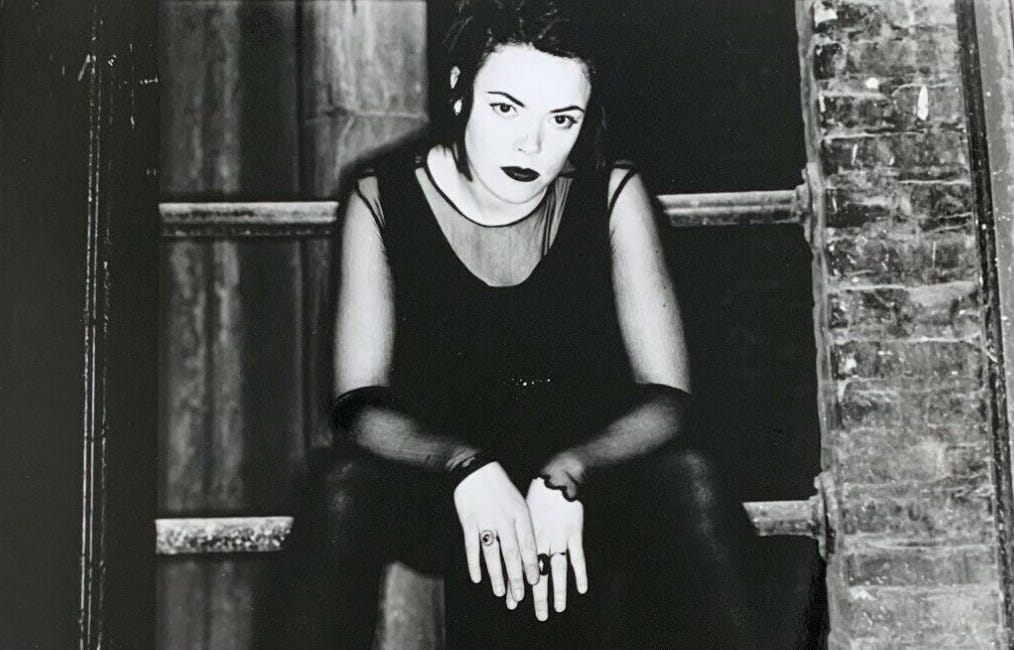Ruby | History of the Band
From Trip-Hop to Electronic: Tracing Ruby Through the 90s and Beyond
Formation and Early Years
Ruby was formed 1994 by Lesley Rankine and Mark Walk, after Rankine departed from her previous band, Silverfish. Rankine, known for her distinctive vocal style and confrontational lyrics, teamed up with Walk, an American producer and musician, to explore new musical territories. Their collaboration was born out of a shared desire to blend electronic music with more traditional rock elements, creating a sound that was both innovative and reflective of the era's burgeoning electronic scene.
Tim Minneci suggested this artist for a future Dig Me Out podcast episode. Each month, our Patrons are presented with a selection of albums suggested by listeners and asked to vote for their favorite. The album with the most votes is given another minute in the spotlight. Vote and share your thoughts.
Musical Style and Evolution
Ruby's music was initially a fusion of trip-hop, industrial, and electronic influences, marked by Rankine's raw, emotive vocals and Walk's sophisticated production techniques. Their debut album, "Salt Peter," released in 1995, showcased this blend, earning them critical acclaim for its innovative sound. The album's tracks ranged from the aggressively electronic to the hauntingly introspective, reflecting the duo's wide-ranging musical influences and ambitions. Over the 1990s, Ruby's sound evolved with more organic instruments and a subtle shift towards a slightly more accessible sound, without sacrificing their experimental edge.
Discography and Notable 90s Albums & Singles
"Salt Peter" (1995): Ruby's debut album was a critical success, noted for its innovative blend of genres and the standout track "Tiny Meat," which became a hit in alternative circles. The album was released on Creation Records in the UK and WORK Group in the US, showcasing Ruby's global appeal. The production, handled by Walk and Rankine, was praised for its creativity and depth, with "Salt Peter" becoming a landmark release in the mid-90s alternative scene. Critics lauded "Salt Peter" for its inventive sound and Rankine's compelling vocal performances. Publications like NME and Melody Maker highlighted the album's unique place in the electronic music landscape of the time, praising its blend of aggression and melody. The album's reception cemented Ruby's reputation as an innovative musician capable of easily crossing genre boundaries.
Paraffin" (1995): Released as the first single from their debut album "Salt Peter," "Paraffin" showcased Ruby's innovative approach to electronic music. The single featured various mixes, including a Red Snapper mix and a Richard Fearless Dub, expanding the track's reach and showcasing the versatility of the song's composition.
"Tiny Meat" (1995): Perhaps Ruby's best-known song, "Tiny Meat," was released as a single and achieved chart success, notably reaching #22 on the US Modern Rock Tracks chart. The single included a Danny Saber Mix and a Scream Team Remix, among others, adding depth and diversity to its sound.
"Hoops" (1996): Released in early 1996, "Hoops" further demonstrated Ruby's experimental sound, including mixes from Da Lata and David Holmes. The single added to the band's growing reputation for blending electronic and industrial elements in compelling ways.
Remix Albums:
"Revenge, The Sweetest Fruit: Salt Peter Remixed" (1996): This remix album offered a new perspective on "Salt Peter's" tracks, with contributions from various artists, illustrating the broad appeal and adaptability of Ruby's original material.
"Stroking the Full Length" (1996): Another remix album, released in the UK, featured remixes of tracks like "Flippin' Tha Bird" and "Tiny Meat," showcasing the creative possibilities inherent in Ruby's music.
Influence and Legacy
During the years that followed the 1990s, Ruby's discography underwent a metamorphosis, reflecting Lesley Rankine's increasing exploration into electronic and alternative music genres. After the initial success of "Salt Peter," Ruby's musical output expanded, albeit at a more measured pace, showcasing Rankine's versatility as an artist and her commitment to experimenting with sound.
Ruby's post-90s discography comprises "Short-Staffed at the Gene Pool" (2001) and "Altered and Proud" (2001), followed by a hiatus. After a creative revival, Lesley Rankine released "Revert to Type" (EP, 2013), "Waiting for Light" (2014), and "Type-Cast" (EP, 2016), featuring a blend of electronic and alternative sounds with Rankine's distinctive vocal style.
Ruby bridged the gap between rock and electronic music in the 1990s, inspiring artists across genres. Their experimental approach left a lasting impact on the music scene, influencing the sound of many artists who followed. Ruby's fusion of electronic and rock elements, along with Rankine's powerful vocals and Walk's production expertise, made their music both challenging and accessible. Their contribution was significant to the decade's musical mosaic, showcasing the era's diversity and experimental spirit.
Sources
Wikipedia
NME
Melody Maker





